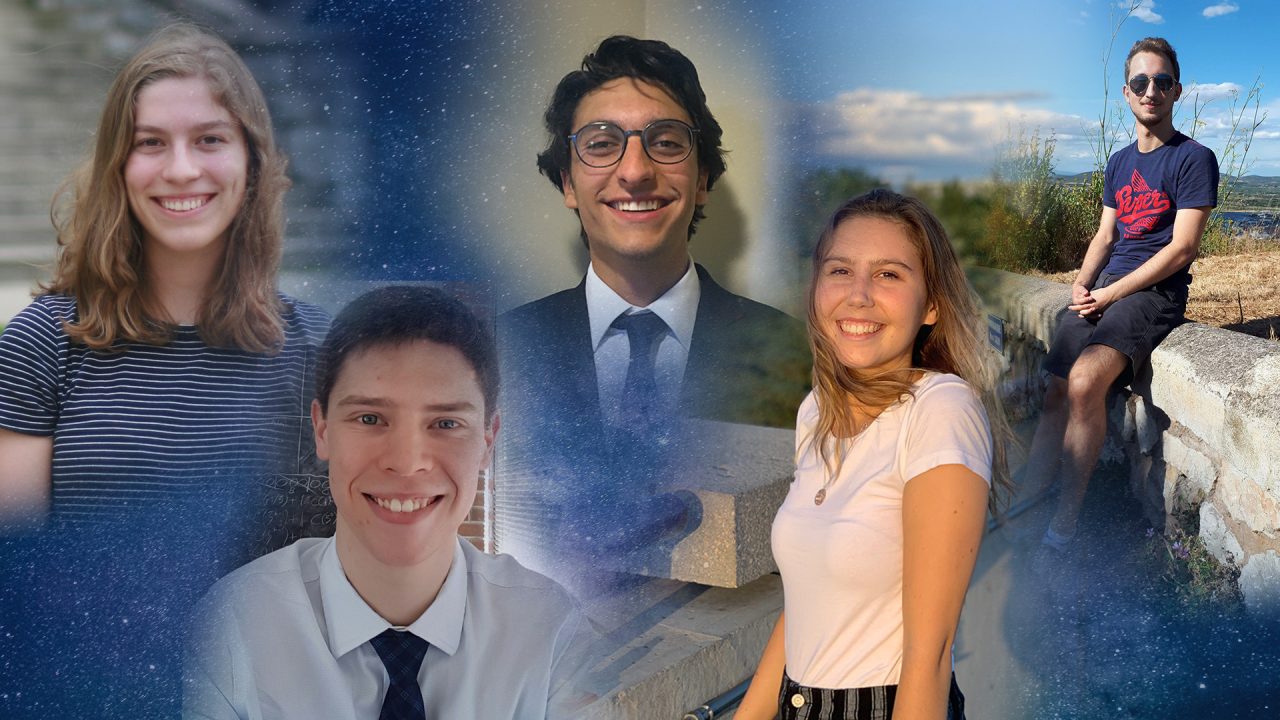News & Events
October 2, 2020
Celebrating the Success of the Summer 2020 Cross-Disciplinary Interns
Students who participated in the pilot Cross-Disciplinary Internship through the McDonald Institute celebrated the conclusion of their four-month virtual placement at the Annual National Meeting. We were delighted to host Emily Darling, Kaelan Renault, Georges Kanaan, Sidney Leggett (Wápiskisiw Pinésiw Iskwéw) and Lucas Fenaux as our inaugural interns for the summer 2020 term.

(Left to right: Emily Darling, Kaelan Renault, Georges Kanaan, Sidney Leggett (Wápiskisiw Pinésiw Iskwéw), and Lucas Fenaux.)
Emily Darling (undergraduate, Geological Sciences, Queen’s University) spent her summer working virtually with Dr. Simon Viel at Carleton University on a project entitled “Muon flux characterization in the DEAP-3600 water Cherenkov muon veto”. She developed knowledge mobilization materials for the general public to learn more about astroparticle physics research. Emily won first prize at the McDonald Institute’s Annual National Meeting for her poster presentation outlining the work achieved with Dr. Viel’s research group over the summer!
Kaelan Renault (Master’s student, Computational Sciences, Laurentian University) worked with Dr. Clarence Virtue on “Modeling of the Neutron Detector Characterisation Facility for Supernova Physics”. Through his research, Kaelan developed a user manual to execute a mini-HALO Monte Carlo simulation for researchers at SNOLAB.
Sidney Leggett (undergraduate student, Computer Science, The University of Winnipeg) worked virtually with Dr. Matthew Leybourne at Queen’s University on the development of novel isotopic techniques in neutrinoless double beta decay and low-background in support of astroparticle physics. Sidney developed knowledge mobilization materials for the general public to learn more about geological applications to astroparticle physics research.
Georges Kanaan and Lucas Fenaux (both undergraduate students, Computer Science, University of Toronto) were involved with “Applying Machine Learning to Event Reconstruction for the SuperCDMS SNOLAB Experiment” with Dr. Miriam Diamond at the University of Toronto. Together, Georges and Lucas provided a presentation applying machine learning to the search for dark matter.
Congratulations to all interns on their successful summer!
If you have any questions about the CDI 2020 program or knowledge mobilization materials, please contact the Research Personnel and Event Coordinator at admin@mcdonaldinstitute.ca.
The Cross-Disciplinary Internship (CDI) Calls for Proposals Announced!
The Cross-Disciplinary Internship program provides a salary reimbursement for full- or part-time students registered in non-physics majors to participate in astroparticle physics research. Non-physics disciplines include, but are not limited to, artificial intelligence, biology, chemistry, climate change, computer sciences, cultural studies, economics, education, engineering, gender studies, geography, geological sciences, health studies, history, Indigenous studies, law, sociology, etc. By design, the CDI program aims to enhance the student experience by building unique and meaningful collaborations to engage in discovery-based research. Creative and novel collaborations are highly encouraged and prioritized for funding.
Up to six positions will be funded at a value of $12,000 CAN each for the CDI 2021 funding call. The application deadline is Friday, November 27, 2020, at 4 pm EDT.
Application guidelines, eligibility, and documents are available on the CDI website: https://mcdonaldinstitute.ca/cdinternship/.
If you are an astroparticle physics researcher and you would like to advertise your lab and potential projects, please be in touch with our Business Development Officer at alexandra.pedersen@mcdonaldinstitute.ca. Examples from faculty are available on the CDI website. We encourage researchers to reach out to non-physics departments at their host institution to advertise this unique opportunity!
